 Teamwork is a key part of customer service. Even though you work hard individually, you are part of an organization that relies on each other. There are 5 components of winning teams:
Teamwork is a key part of customer service. Even though you work hard individually, you are part of an organization that relies on each other. There are 5 components of winning teams:
- Trust
- Proactivity
- Communication
- Practice
- Loyalty
The most vital part of a customer service team is Loyalty.
According to Webster’s Dictionary loyalty is defined as “Being faithful to a person, ideal, custom, homeland or government.” Loyalty is wound into every fabric of our lives; customer loyalty, job loyalty, school loyalty, loyalty to a spouse, sports team, diet, fitness program and on and on.
If you are going to be a top performer, there can be no question about your loyalty in three areas. You must be loyal to yourself, to those with whom you live and work, and to your organization. That encompasses every customer imaginable.
To be loyal to yourself, you must work to maintain a healthy self-image. This is not an over inflated ego or the kind of self-confidence that “generally occurs just before we really understand the situation.” Loyalty to yourself means looking for the evidence that supports why you should believe in you.
“You cannot consistently perform in a manner which is inconsistent with the way in which you see yourself.” I cannot stress too much the importance of “seeing” yourself successfully completing your daily tasks. Do you think the heavyweight boxing champion of the world goes into the ring questioning his ability? Absolutely not. Drew Brees, Super Bowl Champion of the New Orleans Saints does not step into the huddle and timidly ask for advice from his teammates!! Rafael Nadal expects to win all of his tennis matches. Tiger Woods expects to be the top money winner on the professional golf tour
Believing in yourself and being loyal to yourself will help you move toward becoming the best at winning new customers. When I say that loyalty to your organization is important, I do not mean you should accept every thought that comes from upper management as if it had come from above and is written in stone. No one expects you to leap with joy when the commission structure has been changed so that there is more for the company and less for you. You may not be overjoyed with management when the working hours are changed and you are allowed to work more hours for the same or less pay. Loyalty to your organization means handling these aggravations in the proper manner. For example not complaining about your areas of concern over coffee with a co-worker who has no authority to change the situation. You do not identify internal problems externally–meaning to someone outside your organization. The person who takes either of these avenues becomes a cancer to the organization. As you know, a cancer is a cell that lives within the body independently of the other cells of the body, and unless it is removed it will eventually lead to the death of the body.
How, then, should the loyal employee manage the situation? The proper method of handling any situation that concerns you is to take the “problem identified” to someone who has the authority to handle the situation. Present it and several “potential solutions” for consideration. If after a realistic amount of time the company takes action on your recommendations or another satisfactory solution, you should congratulate yourself for working from within the organization to make it stronger.
However, if after a realistic amount of time the company fails to take action to change the situation, you have two options; 1) shut up 2) move on. There are no other options! Loyalty to the company is important, but the other side of the coin is that management and the corporation owe that same loyalty to their people.
Here are six tips to help us all be more loyal.
- Make yourself lighter to lift. Be upbeat and likable.
- Be a good listener. Customers like to talk about themselves, acommodate them.
- Accept human deficiencies and limitations; nobody is perfect.
- Find qualities to like and admire about others.
- When you disagree, remember, you can disagree without being disagreeable.
- And number 6……….practice courtesy. It makes people feel better
Loyalty, very simply, is the desire to help customers (even CO-workers) become successful in any or all areas of life. And there are many different types of success. You CAN get what you want if you first help enough other people get what they want.
